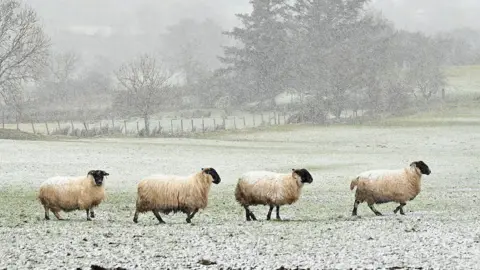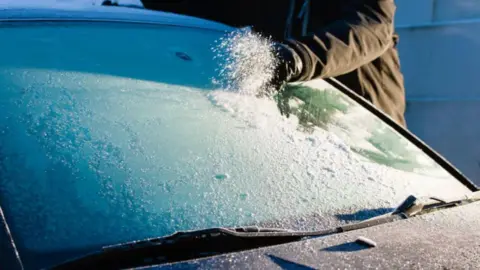Warning of snow and ice as temperatures drop
 Pacemaker
PacemakerA spell of wintry weather is set to reach Northern Ireland late on Monday, bringing a risk of disruption.
Outbreaks of rain spreading west during the afternoon will turn to sleet and wet snow at times.
Snowfall is expected to affect higher ground, especially more than 200m, with some already spotted on the Glenshane Pass.
The highest peaks of the Sperrins and Mournes could get between 5 and 10cm of snow, according to the Met Office.
The organisation has issued a weather warning for snow and ice for Northern Ireland, which began at 15:00 GMT on Monday and will last until 10:00 on Tuesday.
 Getty Images
Getty ImagesChallenging travel conditions
Snow is unlikely to settle on lower ground but other wintry conditions could pose a challenge.
A clear sky overnight will allow temperatures to plummet quite widely, allowing frost and ice to form on untreated surfaces.
This could lead to difficult and hazardous travel conditions.
In the Republic of Ireland, a yellow weather warning has also been issued for counties surrounding Northern Ireland.
Irish weather service Met Éireann is warning of snow and ice for counties Cavan, Monaghan, Donegal, Sligo and Leitrim.
That warning is in place from 19:00 local time on Monday until 08:00 on Tuesday.
How do I protect my house in cold weather?
NI Water has issued a warning that the colder weather could bring an increased risk of burst pipes.
It said when temperatures drop below zero over a prolonged period of time, the water in the pipes can freeze and expand.
When the water thaws, the pipes can contract and cause them to crack or burst.
Maynard Cousley, NI Water's water supply senior manager, said there were a number of ways to protect households, including:
- Fix any dripping taps, both inside and outside, to avoid frozen pipes
- Check the central heating boiler has been recently serviced
- Wrap up pipes and water tanks with lagging to insulate them
- Find the property's stop valve and make sure it can be turned off
